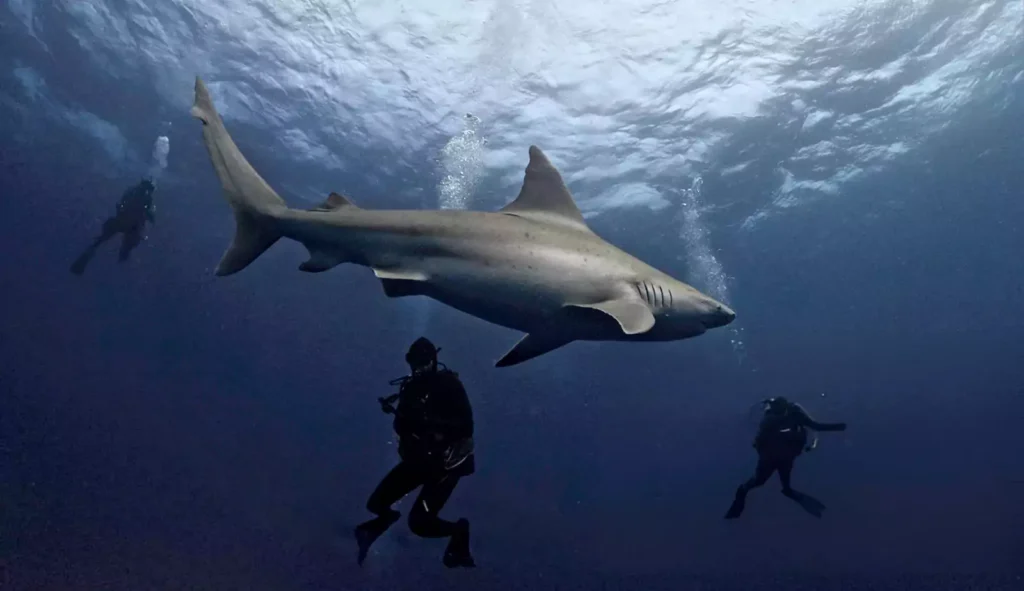Debunking the Viral Kodiak Shark Hoax: No 65-Foot Freshwater Shark in Lake Michigan
4 min read
JESUS OLARTE/AFP via Getty Images
Recently, TikTok and other social media platforms have been flooded with rumors claiming that a massive 65-foot “Kodiak shark” has been sighted in Lake Michigan, sparking excitement and concern. This alleged freshwater predator has been said to pose a threat to swimmers, with videos showing exaggerated images of the supposed shark stirring up curiosity online. However, authorities, local health institutions, and marine experts are actively refuting these claims, emphasizing that no evidence supports the existence of a Kodiak shark in Lake Michigan.
Viral Videos Claim a Freshwater Giant in Lake Michigan
The rumor of the Kodiak shark in Lake Michigan began gaining traction after an October 4, 2024, TikTok video purportedly showed a gigantic shark species unique to freshwater environments. The video’s creator alleged that this “Kodiak shark” was responsible for several attacks, with alleged victims reportedly receiving treatment at Michigan’s Corewell Health Lakeland Hospital. These claims quickly escalated, generating hundreds of thousands of views and widespread discussion about the supposed dangers in Lake Michigan.
Authorities Deny Shark Attack Incidents
Shortly after the Kodiak shark rumors took off, Corewell Health Lakeland Hospital directly addressed the claims, with spokesperson Amanda Klingbail stating that no records indicate patients treated for shark-related injuries at the hospital. Meanwhile, Michigan’s Department of Natural Resources (DNR) also publicly dismissed the idea. Ed Golder, DNR’s public information officer, confirmed that “no evidence of a Kodiak shark” has been found in Lake Michigan, adding that the department had received inquiries but found no data to substantiate the viral claims.
Freshwater Sharks: Myths and Realities
There are only a few species of sharks in the world that can survive in freshwater, primarily in rivers, not lakes. Known freshwater-capable sharks include the Speartooth Shark, Ganges Shark, and Northern River Shark, but these species are highly specialized to live in river systems rather than vast freshwater lakes. The bull shark is one rare species that can adapt between fresh and saltwater environments. However, it has not been recorded in large North American lakes like Lake Michigan, and encounters are typically rare and restricted to regions with river access to the ocean.
Scientific Consensus: The “Kodiak Shark” Isn’t Real
According to renowned marine biologists and institutions like the Shark Research Institute, the “Kodiak shark” does not exist. Scientists rely on rigorous discovery and documentation processes to identify new species, with announcements shared through credible channels. No species by that name appears in extensive marine databases, such as FishBase, and marine experts explain that a massive species capable of surviving solely in freshwater would require substantial evidence to support such an existence.
Analysis of Viral Footage Suggests Digital Manipulation
Experts analyzing the viral TikTok footage suggest that elements within the video appear digitally enhanced or altered. While online videos often play with viewer perceptions, professionals examining the Kodiak shark claims emphasize that much of the shared content lacks authenticity. Digital edits and animations can create a visually captivating narrative, but these tactics often mislead audiences, especially on platforms where fiction can blend with fact.
@msashleytiktokprty14 #for 𝐰𝐡𝐨 𝐝𝐢𝐝𝐧'𝐭 𝐬𝐞𝐞 𝐢𝐭 👀#bigshark #shark #find #zoom #kodiakshark #see #record #biggiest #viral #viral #fypシ #fypシ #viral #fypシ #fyppppppppppppppppppppppp #fyppppppppppppppppppppppp ♬ She must have been out of her head.. – 🕷️
The Science of Marine Life in Lake Michigan
Advertisement
Lake Michigan is one of the Great Lakes of North America, and while it supports a diverse array of freshwater fish, no marine predators such as sharks inhabit these waters. The lake’s ecosystem sustains species like trout and salmon, which have adapted to its freshwater environment. However, apex predators from the ocean, like sharks, cannot thrive in freshwater long-term due to their physiological needs and dependency on saltwater environments.
Dispelling the Kodiak Shark Myth
Reputable news outlets, including the Detroit Free Press, have actively debunked the Kodiak shark narrative, urging the public to view such sensational videos critically. The fascination with unusual creatures often drives these types of myths, and viral trends can intensify the spread of misinformation. For now, Lake Michigan remains free of any 65-foot freshwater giants, and visitors can rest assured that no Kodiak shark lurks beneath its surface.
In conclusion, while the internet can amplify thrilling tales and eye-catching myths, it’s essential to rely on verified information and expert insight. The story of the Kodiak shark highlights the importance of fact-checking and the ease with which digital media can blur reality, especially when it comes to mysterious creatures. For now, there’s no need for Lake Michigan swimmers to worry about encounters with a freshwater shark — and the Kodiak shark remains a fictional species.



